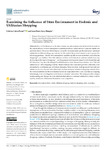Examining the Influence of Store Environment in Hedonic and Utilitarian Shopping

View/
Use this link to cite
http://hdl.handle.net/2183/27252Collections
- Investigación (FEE) [923]
Metadata
Show full item recordTitle
Examining the Influence of Store Environment in Hedonic and Utilitarian ShoppingDate
2021Citation
Calvo-Porral, C. & Lévy-Mangin, J.P. (2021). Examining the Influence of Store Environment in Hedonic and Utilitarian Shopping. Administrative Sciences, 11(1), 1-15. DOI: https://doi.org/10.3390/admsci11010006
Abstract
[Abstract] Much of the literature on the attractiveness and pleasantness of retail stores has focused on
the critical influence of store atmosphere or ambient attributes, which influence customer satisfaction
and store choice. However, little is known about the environmental cues that influence customers’
satisfaction in different shopping contexts. In this context, the present research aims to answer the
following questions: “Are the store atmospheric variables equally relevant in hedonic and utilitarian
shopping?”; and further: “Does the influence of store environment on customer satisfaction vary
depending on the type of shopping?”. For this purpose an empirical research is developed through
PLS Structural Equation Modeling (PLS-SEM) based on data obtained from hedonic (n = 210) and
utilitarian (n = 267) shopping contexts. Results indicate that customers perceive differently store
atmospherics in utilitarian and in hedonic shopping. More precisely, findings report that customer
satisfaction is driven by internal ambient and merchandise layout in hedonic shopping contexts; while
the external ambient and the merchandise layout are major atmospheric cues in utilitarian shopping.
Interestingly, store crowding does not influence customers’ satisfaction. This study provides a deeper
understanding into the specific store attributes that influence customer satisfaction, which could be
used by retailers to differentiate themselves from competitors.
Keywords
Store atmosphere
Retail
Utilitarian shopping
Hedonic shopping
Store crowding
Retail
Utilitarian shopping
Hedonic shopping
Store crowding
Editor version
Rights
Atribución 4.0 internacional
ISSN
2076-3387






